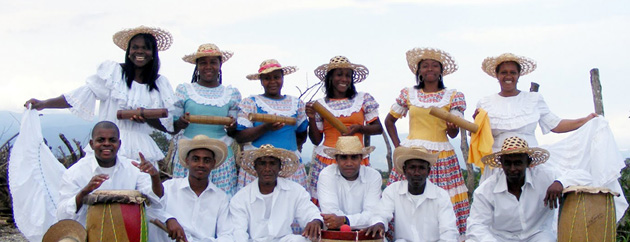
Review Grupo Canalón de Timbiquí – Una Sola Raza
There are few areas that are as important to the musical traditions of South America as the coastal regions of Colombia. Buffeted by the Caribbean Atlantic to the north and the Pacific to the west, these areas have given birth to a range of musical styles that have gained popularity across the Americas and been a key influence on the development of South American music. Much of this music comes from African-Latino communities, whose ancestors’ forced migration centuries ago saw the transplanting of African rhythms, melodies and styles to the new world. Over time this African music gradually merged with indigenous styles to create numerous new musical genres, which again and again criss-crossed with other forms to give Colombian music a distinct mestizo identity.
While recent times have seen outside genres such as rock, salsa and reggae merge with traditional styles to gain wider commercial success, Colombian roots music still holds a wide appeal and attracts a devoted following, while inspiring new generations of musicians. Grupo Canalón de Timbiquí is one such contemporary group who play afro-Colombian folk music that is typical of the coastal regions. Hailing from the town of Timbiquí in Cauca state on the Pacific coast, the five female singers are led by Nidia Gongora and are supported by a band using a range of traditional percussive instruments such as the tambora drum and the xylophone-style marimba.
The latest release from Grupo Canalón de Timbiquí is Una Sola Raza (Only One Race). It is an uplifting album whose enveloping warmth emerges in the harmonious voices of Gongora and the chorus of her backing singers. Their chanting style is deeply reminiscent of traditional African music and full of youthful exuberance that shrouds the music in a sweet innocence. The soft and rounded bounciness of the marimba acts as a perfect companion to the vocals and, over the rattling percussive shuffle of the rhythm section, guides a path through the music.
[soundcloud url=”http://api.soundcloud.com/tracks/29218499″ iframe=”true” /]
While the basic premise of the primary sole use of percussion and singing that marks Una Sola Raza may appear a simple one, its multi-layered rhythms and fluctuating time structures ensure it is far from that. The musical arrangements are intricately fitted into the fabric of the sound, as each percussionist plays a key role in creating the measured rhythmic tones that are a distinguishing feature. As well as providing vocals, the backing singers voices’ become instruments as they deliver melodies that can create a feeling of elation or inject a sense of urgency. It is a key aspect of the sound that enhances the overall dynamic.
Una Sola Raza revolves heavily around themes of regional identity, with numerous songs paying tribute to the people, lands and rivers of the Cauca region. The album opener “Molino Mi Molinete” is a rousing tune that, with its references to ‘masters’, ‘singers’ and ‘poets’, is based in the old songs of slaves that served as a bond with a motherland they would never see again. “Arroz de Mai” prays for a good harvest and celebrates the humble rice grain that forms the staple diet of the region. The clarinet-led beauty of “Conozca Mi Tierra” is an album highlight, and contains an electrifying vocal melody that resonates of love and home. It’s worth noting the Cauca state that Grupo Canalón de Timbiquí come from, and particularly its rural areas, has been one of the most affected by the violence that has plagued Colombia over the years and, as such, these songs speak of a dignity and pride amongst its people, and of light through the darkness.
The subject of light and salvation is also found in the religious tones that form the other key theme of the album. Song titles such as “Salida from Nazareth” (Exit From Nazareth), “Llanto en el Cielo” (Crying in Heaven), and “Maria No Me Llevo” (Mary Don’t Take Me) emphasise the important role played here by divinity. Thankfully, these songs are by and large jovial celebrations of affirmation, rather than solemn statements of piety, that are as equally charged with the zestful exuberance that channels throughout the rest of the album. The album’s only truly weak moment comes with an overdoing of the festive tones in a pointless rendition of ‘Happy Birthday to You’ that is a little too novelty for comfort.
As a whole Una Sola Raza is an intriguing record for anyone keen to explore the folklore traditions of Colombian music, and particularly for those interested in the numerous cultural bridges that connect Latin America with Africa. The elated energy of Grupo Canalón de Timbiquí’s music and the exquisite vocal performance is coupled with a sense of social commentary that manifests itself in the simple yet common themes of their lyrics. This offers insight into many aspects of regional identity, particularly that of African-Latinos, and is therefore a recommended listen for anyone whose interests in South America run deeper than the surface.
Una Sola Raza is not currently avaiable in the US or UK. More information on Grupo Canalón de Timbiquí can be found at facebook.com/canalondetimbiqui
[soundcloud url=”http://api.soundcloud.com/tracks/29217436″ iframe=”true” /]
Follow Sounds and Colours: Facebook / Twitter / Instagram / Mixcloud / Soundcloud / Bandcamp
Subscribe to the Sounds and Colours Newsletter for regular updates, news and competitions bringing the best of Latin American culture direct to your Inbox.

